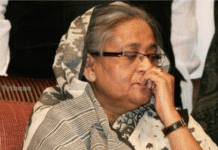
David Bergman, a British journalist known for his investigative reporting on Bangladesh’s political landscape, has responded to an NYT article discussing the resurgence of Islamic religious forces in Bangladesh following the fall of the Awami League government in August 2024.
In a post shared on social media platform X yesterday afternoon (1 April), he described the piece as a “generally fair representation” of the growing influence of these forces in civil society.
According to Bergman, the collapse of the Awami League has created a power vacuum, which has allowed previously suppressed religious political movements, including Jamaat-e-Islami, to regain strength.
He acknowledged that the interim government, led by Nobel Laureate Muhammad Yunus, has made efforts to counter some of these religious forces.
Bergman also acknowledged the interim government and Chief Adviser Yunus’s advocacy for women’s rights, while also noting that it may not be sufficient, emphasising that the government itself is composed of a mix of political allegiances, making it difficult to take a unified stance.
“It is now up to those who support a more secular Bangladesh to raise their voices,” he wrote, but also noted that many of these voices have been subdued.
This, he argued, is because a significant portion of secular supporters were aligned with the Awami League, and in the current political climate, it is difficult for them to be openly vocal.
Read the full post below:
The Chief Adviser’s Press Wing said the report portrays a one-sided view of the country and risks unfairly smearing an entire nation.
“The New York Times article paints a troubling and one-sided view of Bangladesh, suggesting that the country is on the brink of being overtaken by religious extremism. This portrayal not only oversimplifies the political and social dynamics of the country but also risks unfairly smearing an entire nation of 180 million people,” Chief Adviser’s Press Secretary Shafiqul Alam said in a statement posted on Facebook.









